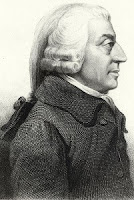
I mentioned quite a while back my intentions on getting through the unabridged version of Adam Smith's famous The Wealth of Nations before the year was out. I have been steadily chipping away at the book over the last several months and have finally made it to the halfway point (603 pages!). It's truly been a love/hate affair. Because of this I've only been able to dabble in the book from time to time; sustained readings of this book are, for me at any rate, quite difficult to maintain. Now there have been many parts of the book that I've found stimulating and quite refreshing, especially Smith's chapters detailing the origins of commerce and the development of specie as the preferred instrument of commerce. But there have been others, particularly a plethora of chapters detailing certain elements of an 18th century economy that simply don't apply to the 21st century (a lengthy discussion about ship insurance comes to mind as one example).
But Smith's loquacious discussion concerning entails (kind of like inheritances but to a much more legal complex degree) was one of the harder sections to endure. However, entails were a major part of English society for several centuries and so I knew I would later be burdened by a major defeciency in my understanding if I skipped that discussion (which I certainly was tempted to do) so I bravely carried on.
And I'm definitely glad I did because the value of that section recently came to light from an unexpected source: TV, specifically, a Masterpiece Theatre TV series called Downton Abbey that I've come to enjoy very much. It was created and written by Julian Fellowes who won best original screenplay for the likewise enjoyable Gosford Park. The show is basically a replica of that movie except a couple of decades removed from that film's time period. Like Gosford Park, Downton Abbey deals with the upstairs lives of the British upper class with the downstairs lives of their various assorted servants and the occassional overlaps between the two groups, minus the mystery murder subplot. The show is very well done but I don't want to say too much about it because I want to give it a proper review at some point on this blog.
But the chief story arc in the show pivots around the problems of an entail. The great thing is that because of my perseverance in sticking with Adam Smith's The Wealth of Nations I have been able to understand fully the problems surrounding the entail in the TV show. In short, that lengthy section in Smith's work on entails has enhanced my understanding of this pivotal plot point in the show which in turn has enriched my experience of Downton Abbey as a whole. This unexpected value from laboring through Smith's book has made all the hard work of reading the unabridged version thus far worth it.
But Smith's loquacious discussion concerning entails (kind of like inheritances but to a much more legal complex degree) was one of the harder sections to endure. However, entails were a major part of English society for several centuries and so I knew I would later be burdened by a major defeciency in my understanding if I skipped that discussion (which I certainly was tempted to do) so I bravely carried on.
And I'm definitely glad I did because the value of that section recently came to light from an unexpected source: TV, specifically, a Masterpiece Theatre TV series called Downton Abbey that I've come to enjoy very much. It was created and written by Julian Fellowes who won best original screenplay for the likewise enjoyable Gosford Park. The show is basically a replica of that movie except a couple of decades removed from that film's time period. Like Gosford Park, Downton Abbey deals with the upstairs lives of the British upper class with the downstairs lives of their various assorted servants and the occassional overlaps between the two groups, minus the mystery murder subplot. The show is very well done but I don't want to say too much about it because I want to give it a proper review at some point on this blog.
But the chief story arc in the show pivots around the problems of an entail. The great thing is that because of my perseverance in sticking with Adam Smith's The Wealth of Nations I have been able to understand fully the problems surrounding the entail in the TV show. In short, that lengthy section in Smith's work on entails has enhanced my understanding of this pivotal plot point in the show which in turn has enriched my experience of Downton Abbey as a whole. This unexpected value from laboring through Smith's book has made all the hard work of reading the unabridged version thus far worth it.
No comments:
Post a Comment